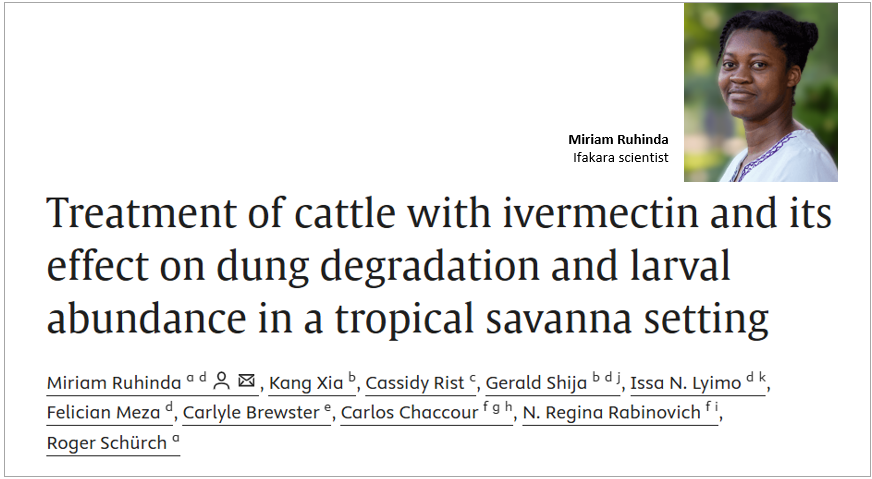
ECOSYSTEM: Evaluating environmental and malaria control effects of “Ivermectin” in livestock

In the ongoing fight against malaria, ivermectin mass drug administration (MDA) in livestock has emerged as a promising method for reducing mosquito populations, as mosquitoes ingest the drug through blood meals. However, concerns about its environmental impact persist.
A recent study conducted in Tanzania highlights the ecological implications of this intervention, particularly its effects on dung degradation and the survival of dung-dependent organisms in tropical savanna ecosystems. The findings underscore the complex environmental trade-offs associated with using ivermectin for malaria control, offering critical insights into how such strategies may influence broader ecosystem dynamics.
Investigating ivermectin’s effects on dung
The study led by Ifakara Health Institute scientists in collaboration with colleagues from the USA and Spain, compared dung from ivermectin-treated cattle with untreated dung.
They examined how the drug influenced key factors such as dung degradation, termite colonization, larval abundance, and changes in organic matter. The findings were published in Science Direct.
Insights on effects of ivermectin on dung degradation
The study revealed several insights into the effects of ivermectin on dung degradation and the organisms involved in this process. First, termites, which play a significant role in dung breakdown in tropical ecosystems, were more likely to colonize ivermectin-treated dung compared to untreated dung.
Despite the higher termite activity, the dung treated with ivermectin degraded more slowly in the first two weeks than untreated dung. This indicates that ivermectin may interfere with the initial stages of decomposition, slowing down the natural breakdown of organic material.
Additionally, ivermectin-treated dung showed fewer larvae after the first month, which points to a reduction in insect populations that are typically responsible for nutrient recycling in dung. This reduction could potentially affect the health of pasturelands by disrupting nutrient dynamics.
Finally, both treated and untreated dung showed similar patterns of organic matter reduction over time, yet the total organic matter in ivermectin-treated dung remained higher, indicating slower decomposition.
Why these findings matter
The findings show that ivermectin and its metabolites have measurable effects on dung degradation and fauna in tropical savanna ecosystems. Slower dung breakdown and reduced insect abundance can negatively impact pastureland health and agricultural productivity. These unintended effects raise questions about the sustainability of using ivermectin in large-scale MDA programs without causing environmental problems.
Balancing between public health, environmental sustainability
While ivermectin’s potential to reduce malaria transmission is significant, its environmental implications must be carefully considered recommends the scientists.
They emphasize the need for further investigation to better understand these impacts in real-world settings. Policymakers and public health practitioners need to weigh the benefits of malaria control against the potential ecological risks to ensure that interventions are both effective and sustainable.
This study underscores the importance of adopting a holistic approach to public health strategies that account for their broader environmental impacts, particularly in vulnerable ecosystems like those in tropical regions.
Ifakara scientist leads the study
The study was led by Ifakara Health Institute scientist Mirima Ruhinda, who is also affiliated with Virginia Polytechnic Institute & State University (USA). Other Ifakara scientists involved include Gerald Shija, Issa Lyimo, and Felician Meza.
Additional contributors to the study include Kang Xia, Cassidy Rist and Roger Schürch from Virgina Polytechnic Institute & State University (USA); Carlyle Brewster from Clemson University (USA); and Carlos Chaccour and Regina Rabinovich from ISGlobal, Barcelona Institute for Global Health (Spain).
Read the publication here.
